The country’s most sustainable college farm prepares students for future agricultural careers
Every so often, students have a foot-stompin’ good time at the Berea College Farm. The dance floor is a bucket. The music is the sound created by feet squishing tomatoes.
It’s part of the process of saving organic tomato seeds and just one of the tasks the Agriculture and Natural Resources students who work on the farm experience in small-scale, sustainable practices.
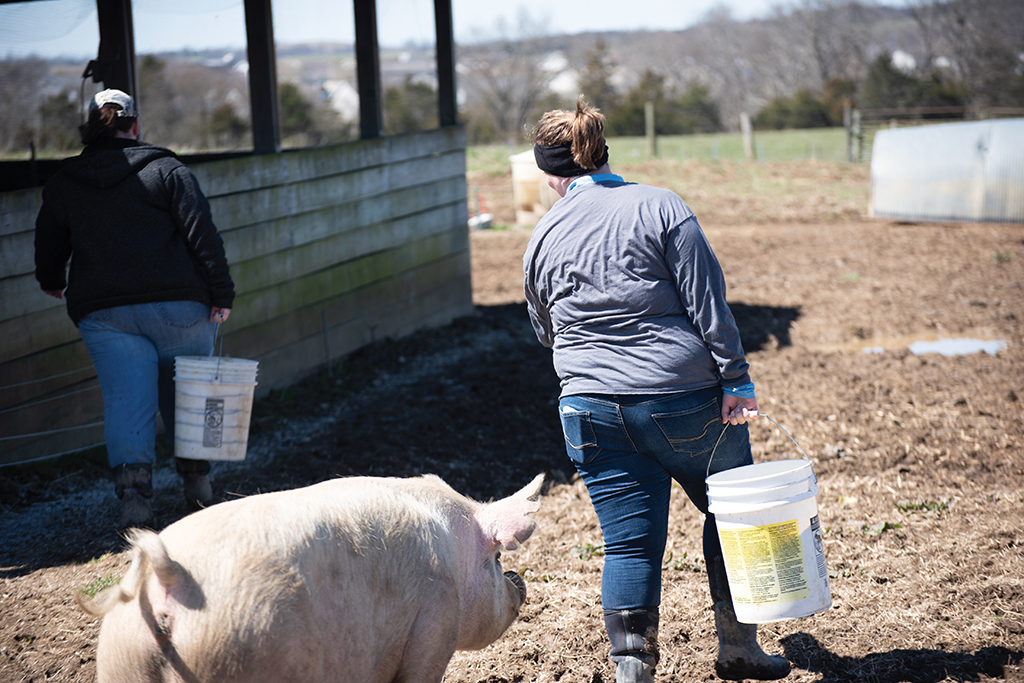
First, they pick the reddest, ripest tomatoes they can find and toss them in a bucket. Then, they take off their shoes and socks, roll up their pants and step in, squishing the tomatoes into a fragrant soup. A 72-hour wait allows for a bit of fermentation to take place. This natural chemical wizardry removes the hard coating from the seeds, required for timely seed germination. The seeds are then sold through Southern Exposure Seed Exchange.
That is the kind of knowledge it’s hard to learn in the classroom and is just one example of the lessons that garnered the College Farm a No. 1 ranking as the most sustainable college farm in America last October. College Values Online ranked schools by a mix of factors, including environmental methods, student involvement, connection with instruction and enterprise diversity.
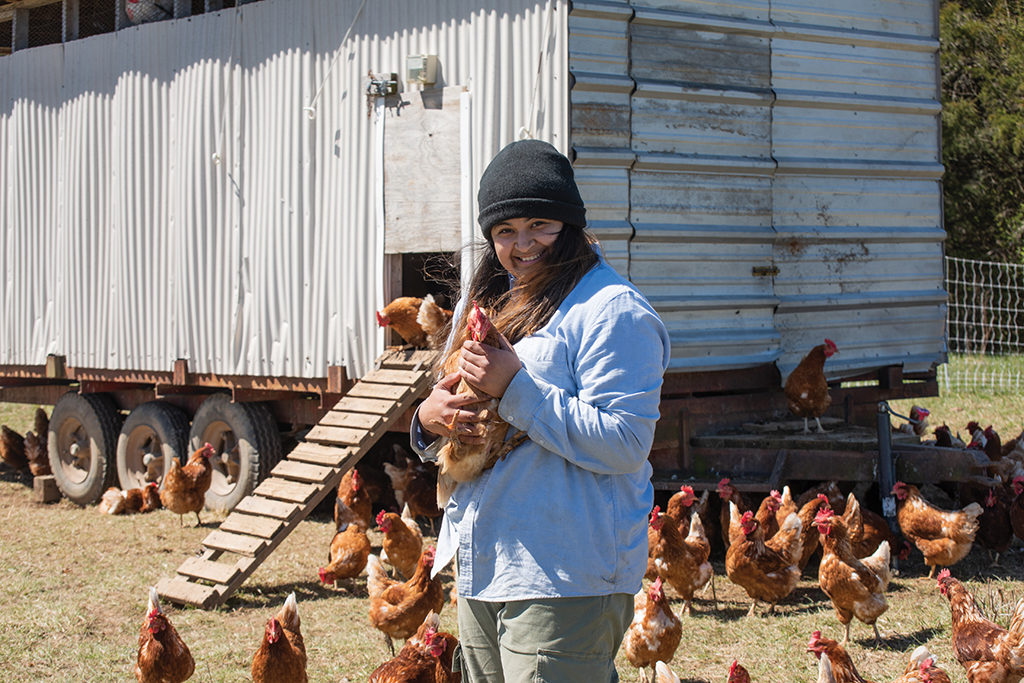
For almost 150 years, students at Berea have been learning and working on one of the oldest continuously-operating student educational farms in the United States. The farm is not a single entity, but a dynamic number of enterprises spread over 500 acres. Currently, projects include vegetables, cattle, seeds, wheat, hogs, mushrooms, honey bees, corn, chickens, eggs, fruit and oats.
The farm’s emphasis on sustainable practices stems directly from the College’s Great Commitments, with values like equality, mindful living and concern for the welfare of others. The farm has incorporated some basic environmentally sustainable practices for almost 20 years. All fruits and vegetables are USDA Certified Organic. Waste from the college dining hall is transformed into compost for the gardens and greenhouse, providing 100 percent of the potting medium. Heat for the main greenhouse is partially provided by a wood furnace.
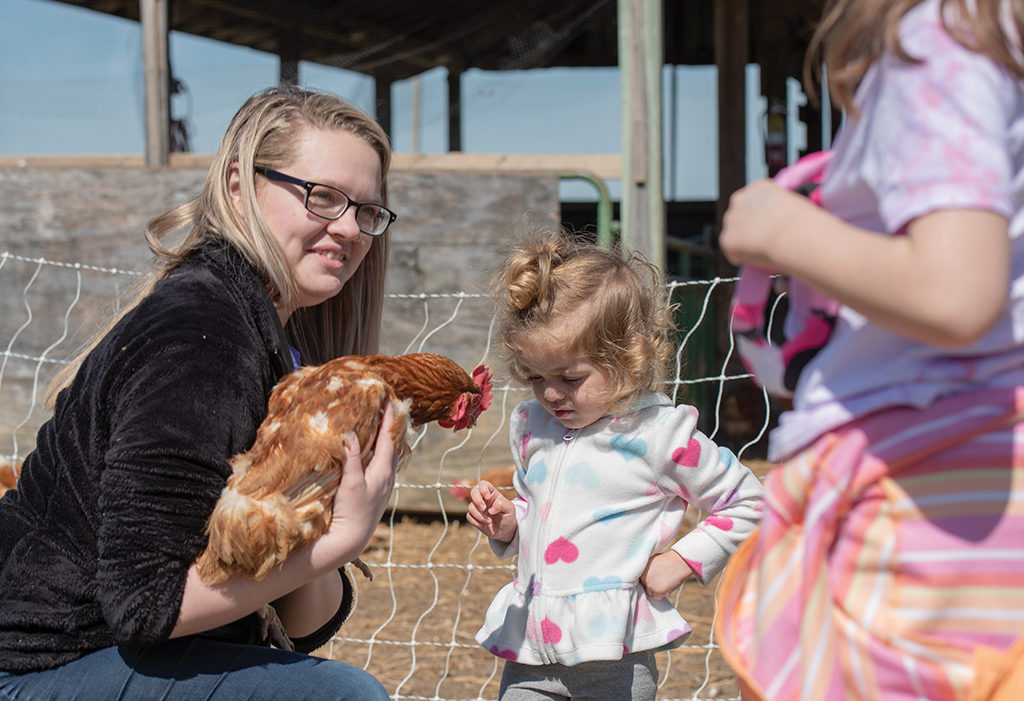
About a decade ago, a visioning process focused the complex work of the farm on two simple goals. The first is: The farm enterprises are models of sustainable agricultural production in the region. Sustainability was further defined as not just environmental, but also economic, social and humane. In the Kentucky region, small farms with limited resources are the norm. Projects implemented at the Berea College Farm balance these elements of scale, economic viability and ecological care.
After embracing this goal, a visionary group of students, staff and faculty developed a plan to transition the farm into a small, diversified, more profitable model with a decreased ecological footprint. Expanding organic crop production allows them to charge a premium price for grain and be better stewards of the land. Pasturing hogs and grass-finishing cattle is more humane and reduces the expense of grain feed. A shift from commodity production to local direct sales increases economic viability as well as reducing “food miles.” Now complete, the transformed operation has fulfilled expectations.
Farm as Learning Laboratory
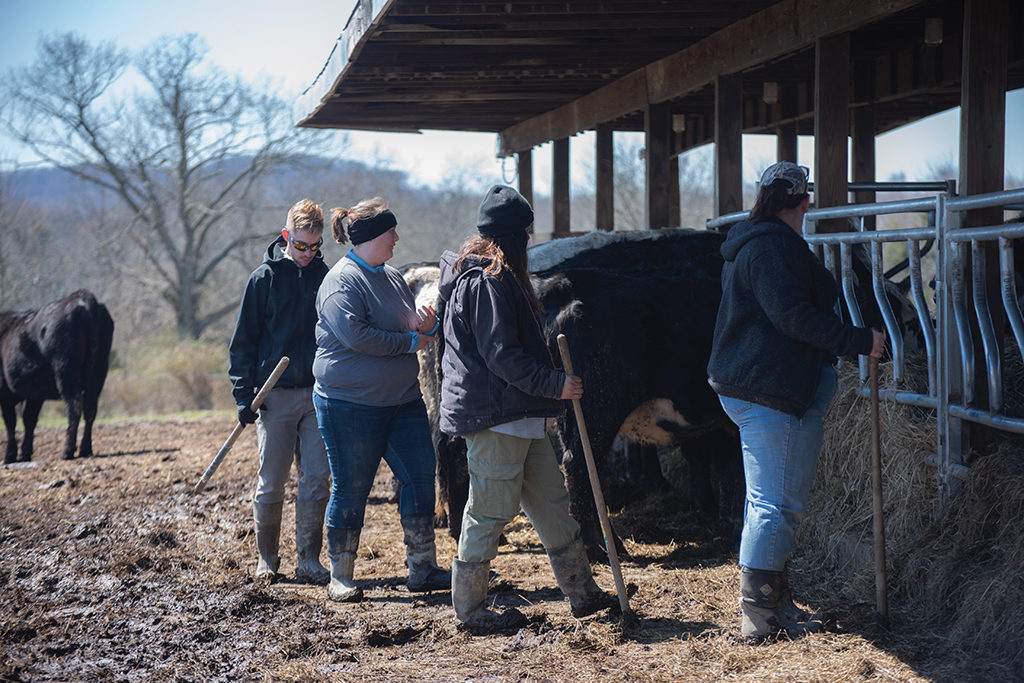
The Berea College Farm as part of an educational institution establishes the second goal identified in the visioning process: The farm is a laboratory to provide students with practical learning experiences. This is especially valuable in the modern context, when many agriculture and natural resources majors at Berea have no farming experience before college.
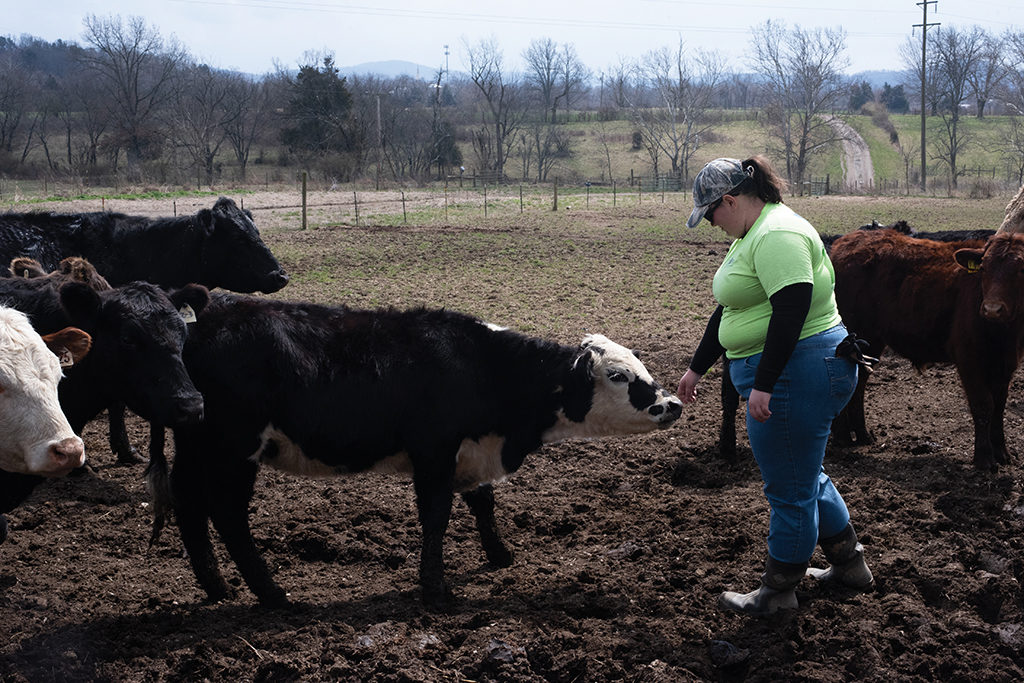
Working a farm labor position is a crucial element of hands-on education for most agriculture and natural resources majors today. They gain experience in all of the enterprises and are involved in all stages of the business, from growing, harvesting and processing to setting budgets, developing value-added products and marketing. Students begin with simple tasks like feeding livestock and watering gardens and by senior year are handling more complex business and management challenges.
“Everyone works—there is no hierarchy,” said junior Kenny Holbrook, who is a student farm manager.
Senior Katlyn Yates was a farming greenhorn when she arrived at college. She affectionately calls her freshman labor experience “the Year of the Fence”—driving fence posts was one of the skills she mastered. She really cut her agricultural teeth on the farm during her third year. She was hired as the manager of the poultry team, even though she knew nothing about birds. The farm plan for that year also included a tripling of the flock size from the previous year.
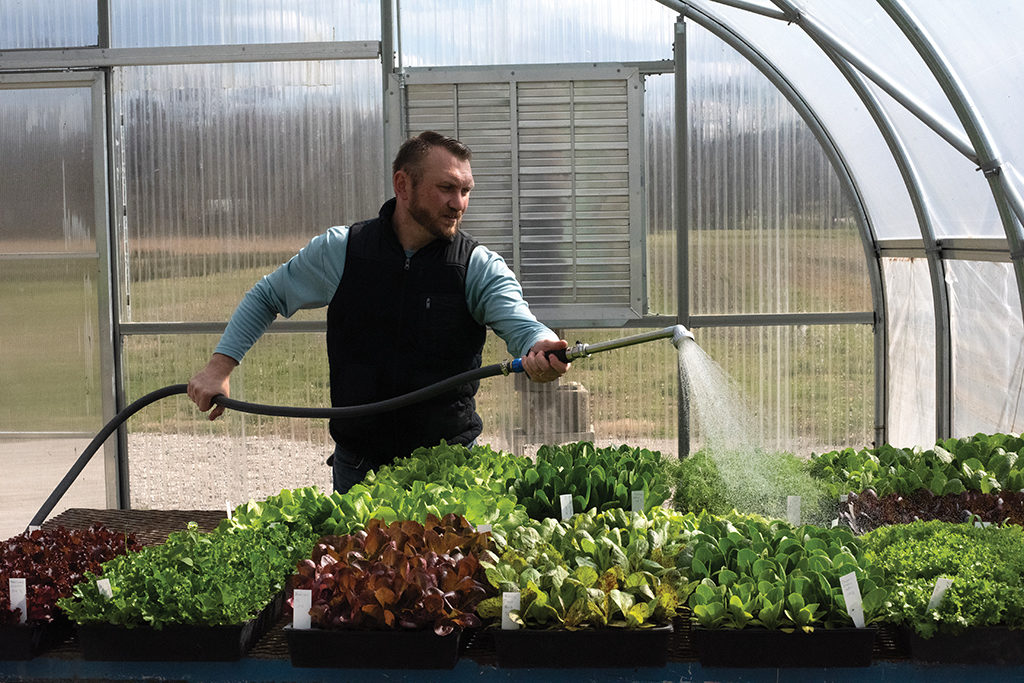
“It was a crash course in poultry management,” Yates said. “It was also the year I think I learned the most, simply because I forced myself to.”
While a challenge, that experience undergirded a growing sense of competence and confidence for her role this year as student farm manager.
“It is extremely gratifying to realize that less than four years ago, I had no idea what I was doing on a farm, and now I am the one people come to for advice,” she said. “My time on the farm has been one of the most rewarding experiences of my life.”
In the academic arena, almost all of the agriculture classes have a farm element. Dr. Sean Clark’s horticulture class this spring is studying Jean-Martin Fortier’s book, “The Market Gardener,” an instruction manual for creating a profitable small-scale intensive organic vegetable farm. Much of the class takes place at the gardens and greenhouse. Students attempt to replicate Fortier’s methods and analyze whether his techniques are viable here. In essence, they are micro-farming: building high tunnels, planning a crop system, planting seeds, measuring yields, problem solving for pests and marketing their products. Besides the obvious experiential benefits, Clark points out the benefit of introducing micro-scale techniques, as many students express an interest in urban farming after graduation.
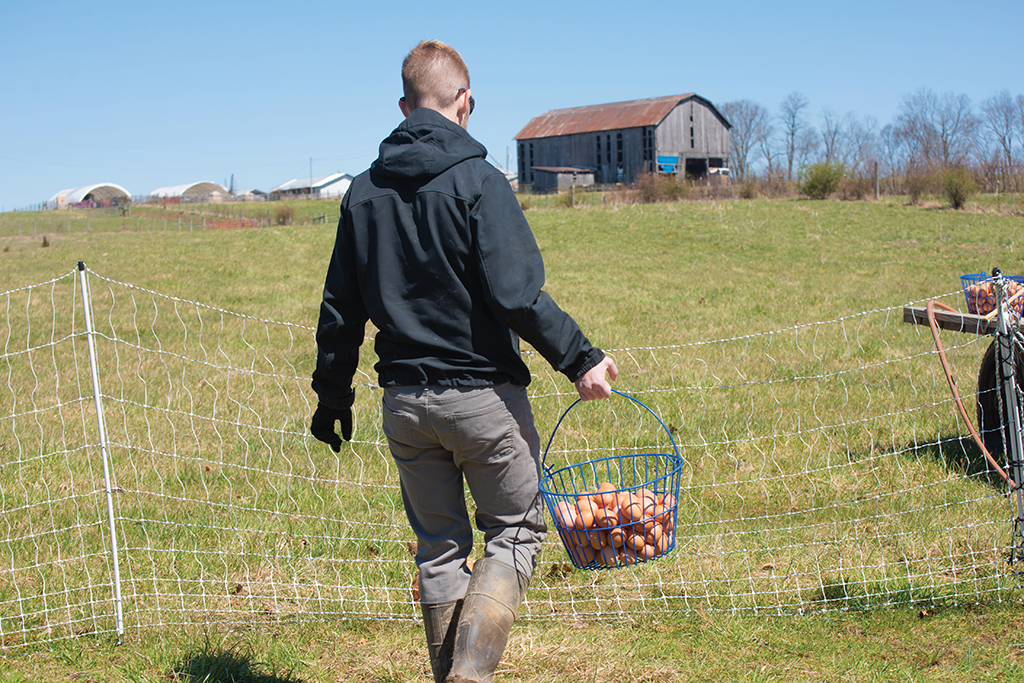
Farm as Inspiration
While not an express goal, the immersive learning on the farm inspires dreams and ignites passions. Partly because of her experience talking with customers at the farm’s spring plant sales, student Horticulture Manager Taylor Robarts wants to educate youth as a 4-H extension agent. Yates’ passion became the farm cattle, and as a result, she changed her career focus to large-animal veterinary medicine.
Sometimes, the physical labor and sheer work of the Berea College Farm offers its own lessons—learned not in the classroom, but together in the field. When a student manager shares her favorite time at the farm, the big sweet potato harvest each November,
the other two in the conversation quickly nod in agreement. Yes, it is a big harvest and yes, it is a lot of work. But like big harvests of old, it draws people together and strengthens the farm community.
“We often have real meaning-of-life conversations in the field,” Robarts reflected.
“It is a nice space for conversation and teamwork,” farm student Eunice Jijon Jarquin added.
Conversation, teamwork and feet squishing tomatoes are all part of what make the Berea College Farm a successful enterprise that honors the seventh Great Commitment while supporting academics and sustainability. That’s sweet music.
Farm to Fork
1871, Berea College President Henry Fairchild established a garden of 1.5 acres with a few dairy cows to provide sustenance for students at the dining hall. Rooted in this practicality, the two major markets now for the College Farm are the Mountaineer Dining Hall and the College Farm Store.
The dining hall is so close to the Gardens and Greenhouse, students often walk to deliver the produce for the salad bar. According to Cait McClanahan, Dining Service sustainability coordinator, more than 75 percent of the hamburgers served come from the farm, and between August 2018 and February 2019, the dining hall purchased 4,300 pounds of poultry.
“We buy from the College Farm because we believe in supporting our own labor program where students are learning how to produce food for markets,” McClanahan said.
The Farm Store opened in 2013 in the renovated historic Broomcraft building and, according to Farm Director Dr. Sean Clark, sells roughly 10,000 pounds of meat, eggs, produce and grains annually. Along with raw farm products, the store sells an array of prepared foods, including fresh baked bread, handcrafted sausages and a daily soup. Approximately 25 percent of Farm Store revenue comes from prepared foods, including weekday lunches and Saturday breakfasts.


